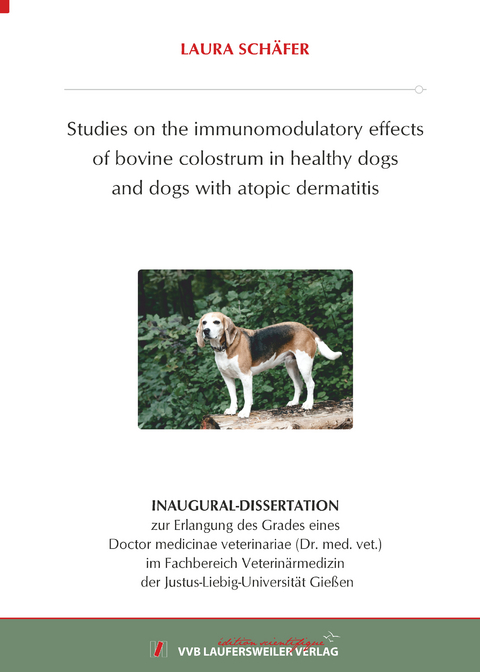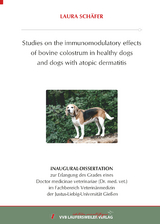Studies on the immunomodulatory effects of bovine colostrum in healthy dogs and dogs with atopic dermatitis
Seiten
2024
VVB Laufersweiler Verlag
978-3-8359-7207-0 (ISBN)
VVB Laufersweiler Verlag
978-3-8359-7207-0 (ISBN)
The aim of the study was to investigate the immunological effects of bovine colostrum in healthy dogs and dogs with AD. In the first study part, 10 healthy beagles were fed a basic diet without or with bovine colostrum of quality 1 (IgG concentration ≥ 25 %) or quality 2 (IgG concentration ≥ 30 %) for 4 weeks each, using a cross-over experimental design. The dietary inclusion level of the bovine colostrum was 0.2 % in dry matter. Two-week wash-out periods were considered between the feeding periods. At the end of each feeding period, blood and fecal samples were collected for several immunological analyses (phenotyping of immune cells, proliferation and phagocytosis assays, measurements of Igs and acute phase proteins). In the second study part, 20 client-owned dogs with AD were included in a placebo-controlled, double-blind study. After an adaptation period of 14 days, the dogs were divided into a placebo or bovine colostrum group. For this, either cellulose (placebo) or bovine colostrum (IgG concentration ≥ 30 %) was supplemented to the regular diets of the dogs at a concentration of 0.2 % in dry matter for 4 weeks. A follow-up period of additional 4 weeks was subsequently considered, where the regular food was offered without the supplements. Blood and fecal samples were collected on day 14, 42 and 70 of the study to measure the same immunological parameters as in the healthy beagle dogs, with the exception of a phenotyping of blood lymphocytes. In addition, skin lesions and the pruritus scores of the dogs were assessed on these evaluation days, and the owners were asked to fill in questionnaires on the QoL and QoC of their dogs. The results demonstrated no immunological effects of bovine colostrum in the healthy and diseased dogs. In the dogs with AD, there were also no differences in the examination of skin lesions, the rating of pruritus, or in the assessment of the QoL. For the QoC, only a minor impact of the dietary treatment could be detected, with a slight improvement of the QoC in the dogs of the bovine colostrum group on day 70 compared to day 14, as reported by the owners. Neither the healthy dogs nor the atopic dogs showed any side effects, why an inclusion of 0.2 % bovine colostrum on a dietary dry matter basis can be considered to be well tolerated in dogs. Future studies could evaluate a potential immunomodulatory impact of higher dietary doses or a different composition of bovine colostrum. Moreover, the measurement of additional immunological parameters might provide further insights into the effects of bovine colostrum in the healthy and diseased organism. Ziel der Studie war es, die immunologische Wirkung von bovinem Kolostrum bei gesunden Hunden und Hunden mit atopischer Dermatitis zu untersuchen. Im ersten Studienteil erhielten 10 gesunde Beagle in einem Cross-over-Design ein Basisfutter ohne bovines Kolostrum oder mit bovinem Kolostrum der Qualität 1 (IgG-Konzentration ≥ 25 %) oder der Qualität 2 (IgG-Konzentration ≥ 30 %) über jeweils 4 Wochen. Der Anteil des bovinen Kolostrums im Futter lag bei 0,2 % der Trockenmasse. Zwischen den einzelnen Fütterungsperioden wurden Auswaschphasen von jeweils zwei Wochen vorgesehen. Am Ende jeder Fütterungsperiode wurden Blut- und Kotproben für verschiedene immunologische Analysen entnommen (Phänotypisierung von Immunzellen, Proliferations- und Phagozytose-Assays, Messungen von Immunglobulinen und Akut-Phase-Proteinen). Im zweiten Teil der Studie wurden 20 Privathunde mit atopischer Dermatitis in einer Placebo-kontrollierten, doppelt verblindeten Studie untersucht. Nach einer Adaptationsperiode von 14 Tagen wurden die Hunde in eine Placebo- und eine Kolostrum-Gruppe eingeteilt. Dazu erhielten die Hunde über 4 Wochen entweder Zellulose (Placebo) oder bovines Kolostrum (IgG-Konzentration ≥ 30 %) in einer Konzentration von 0,2 % der Trockenmasse zum regulären Futter. Anschließend folgte eine Follow-up-Periode von weiteren 4 Wochen, in der nur das reguläre Futter ohne Zellulose oder bovines Kolostrum gegeben wurde. An den Tagen 14, 42 und 70 der Studie wurden Blut- und Kotproben entnommen, um die gleichen immunologischen Parameter wie bei den gesunden Hunden zu messen, mit Ausnahme einer Phänotypisierung von Immunzellen. Außerdem wurden an den Untersuchungstagen die Hautläsionen und die Juckreizwerte der Hunde beurteilt, und die Besitzer:innen gebeten, Fragebögen zur Lebensqualität und zur Fellqualität ihrer Hunde auszufüllen. Die Ergebnisse zeigten keine immunologischen Wirkungen von bovinem Kolostrum bei den gesunden und erkrankten Hunden. Bei den Hunden mit atopischer Dermatitis gab es auch keine Unterschiede bei der Untersuchung der Hautläsionen, der Bewertung des Juckreizes oder bei der Beurteilung der Lebensqualität. Hinsichtlich der Fellqualität konnte ein geringer Fütterungseffekt nachgewiesen werden, indem die Besitzer:innen jener Hunde, die bovines Kolostrum erhielten, eine leichte Verbesserung dieses Parameters an Tag 70 im Vergleich zu Tag 14 feststellten. Weder bei den gesunden Hunden noch bei den atopischen Hunden traten Nebenwirkungen auf, weshalb die Aufnahme von 0,2 % bovinem Kolostrum in der Futtertrockensubstanz als gut verträglich für Hunde angesehen werden kann. Künftige Studien könnten eine potenzielle immunmodulatorische Wirkung bei einer höheren Dosierung oder einer anderen Zusammensetzung des bovinen Kolostrums untersuchen. Auch könnte die Messung zusätzlicher immunologischer Parameter weitere Einblicke in die Effekte von bovinem Kolostrum im gesunden und erkrankten Organismus geben.
| Erscheinungsdatum | 25.10.2024 |
|---|---|
| Reihe/Serie | Edition Scientifique |
| Verlagsort | Gießen |
| Sprache | englisch |
| Maße | 148 x 210 mm |
| Gewicht | 370 g |
| Themenwelt | Veterinärmedizin ► Allgemein |
| Veterinärmedizin ► Vorklinik | |
| Veterinärmedizin ► Kleintier | |
| Schlagworte | Bovines Kolostrum • Hauterkrankungen • Hund • Immunologische Wirkung |
| ISBN-10 | 3-8359-7207-3 / 3835972073 |
| ISBN-13 | 978-3-8359-7207-0 / 9783835972070 |
| Zustand | Neuware |
| Informationen gemäß Produktsicherheitsverordnung (GPSR) | |
| Haben Sie eine Frage zum Produkt? |

